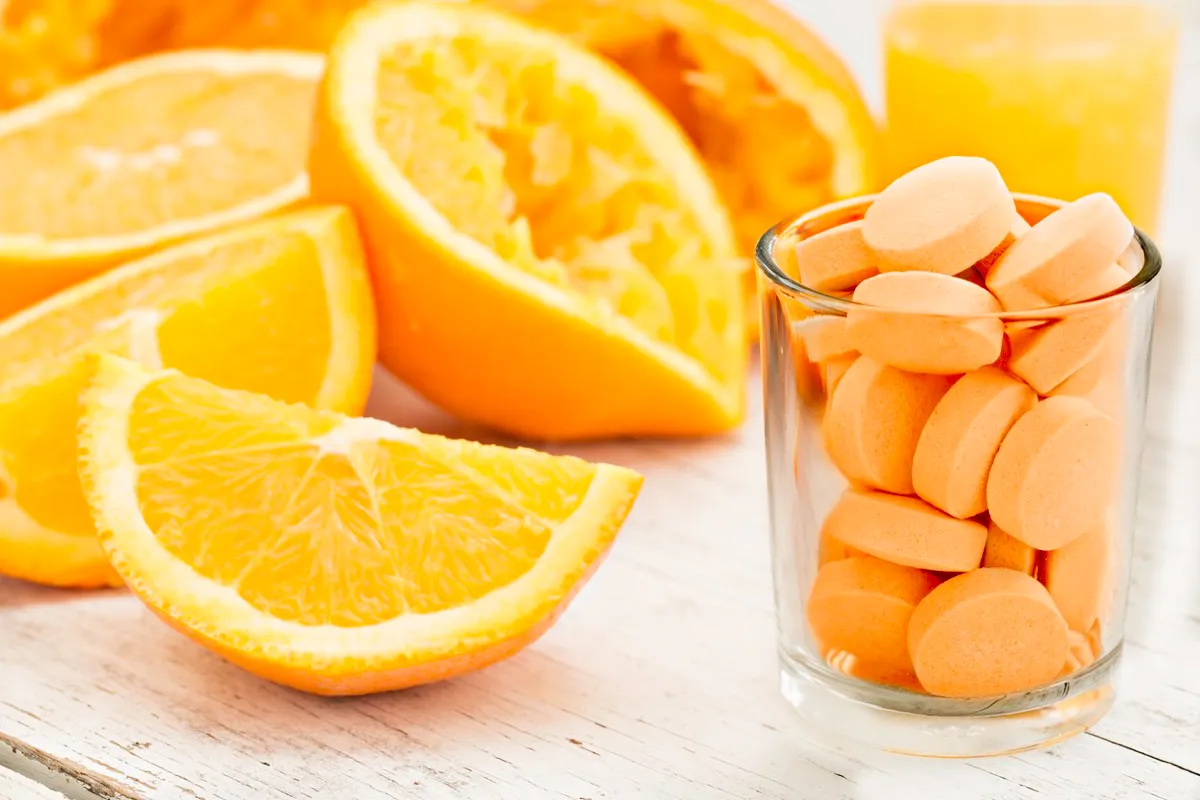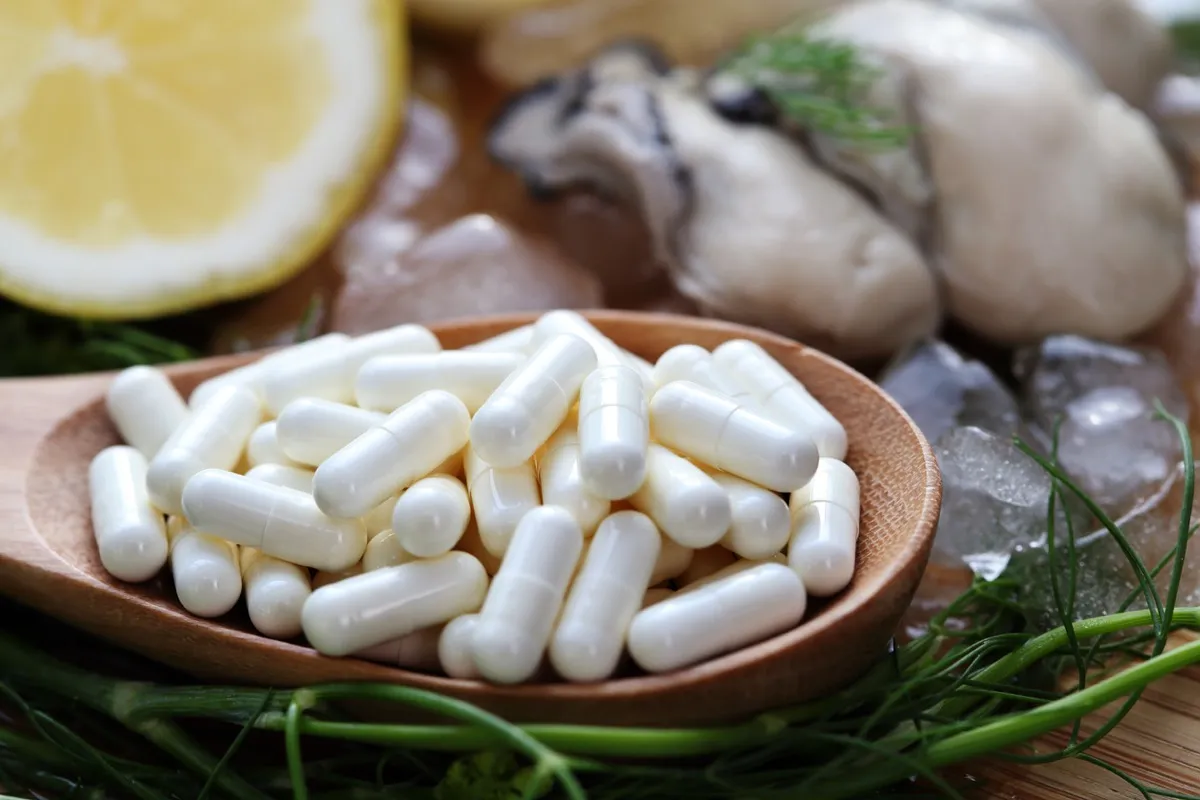5 Best Collagen-Boosting Supplements to Look and Feel Younger

As you get older, your body naturally produces less collagen, an important protein that’s used to make up your skin, bones, muscles, and connective tissues. “With aging, collagen in the deep skin layers changes from a tightly organized network of fibers to an unorganized maze,” explains Harvard Health Publishing. They add that other factors can also affect collagen fibers, leading to skin wrinkling and premature aging. Collagen production decelerates most significantly due to “excess sun exposure, smoking, excess alcohol, and lack of sleep and exercise,” they say.
If you want to look and feel younger, it’s best to focus on righting these major building blocks of your health. However, once you’ve built a healthy foundation, there are additional steps you can take to look and feel your best. For instance, taking certain collagen-boosting supplements can enhance your comprehensive care plan.
Kristopher M. Day, MD, FACS, board-certified plastic and reconstructive surgeon, says several supplements can create a “significant positive impact on your skin’s health by boosting collagen production.” He adds that “a balanced diet and a healthy lifestyle are equally important and work synergistically with supplements to enhance collagen production and overall skin health.”
Read on to hear from Day and other experts about the best collagen-boosting supplements to add to your regimen.
RELATED: 5 Best Anti-Aging Supplements, According to a Doctor.
5 Best Collagen-Boosting Supplements
1. Vitamin C

Vitamin C confers many benefits to the body. For instance, it can protect your cells, help you maintain healthy skin, blood vessels, bones and cartilage, boost your immune system, and help heal wounds.
“Vitamin C is also a crucial nutrient for collagen synthesis. Its antioxidant properties support the skin’s natural regeneration process, and it aids in the repair of damaged skin cells,” Day tells Best Life. “Vitamin C supplements, or better yet, a diet high in Vitamin C-rich fruits and vegetables, can significantly boost collagen production, enhancing skin elasticity and firmness.”
Jacek Szymanowski, a Precision Nutrition-certified nutritionist and health coach, says that you may be able to enhance your absorption of vitamin C by pairing it with iron-rich foods.
2. Omega-3 fatty acids

Omega-3 fatty acids, found in fatty fish and Omega-3 supplements, won’t exactly help your body produce collagen. However, Day says they do “have potent anti-inflammatory properties that can protect collagen in the skin.”
“They help maintain the skin’s integrity, preventing collagen breakdown due to external factors like UV exposure and pollution,” the surgeon explains.
RELATED: 104-Year-Old Woman Reveals Her Anti-Aging Skincare Routine.
3. Zinc

Next, Day recommends adding Zinc to your collagen-boosting supplement routine.
“Zinc plays a pivotal role in collagen synthesis and can help in repairing and rejuvenating the skin,” he says. “This mineral acts as a co-factor for collagen production in the body. Including a zinc supplement in your regimen, or increasing your dietary intake of zinc through foods like nuts, seeds, and legumes, can be beneficial for boosting collagen.”
However, Szymanowski notes that it’s possible to consume too much of the mineral. “High doses of zinc can interfere with the absorption of other minerals like copper, so balance is key,” he tells Best Life.
4. Collagen peptides

Collagen peptides or hydrolyzed collagen supplements have become increasingly popular for their direct role in enhancing collagen levels in the body, Day says.
“These supplements are broken down into smaller, easily absorbable particles that can be directly used by the body to improve skin structure and elasticity,” he explains.
“By supplying specific peptides, they help stimulate the body’s collagen synthesis pathways,” Szymanowski adds. “A lifehack is to add collagen peptides to your morning coffee or smoothie for an easy daily intake,” he suggests.
RELATED: 12 Supplements You Should Never Take Together, Medical Experts Say.
5. Hyaluronic acid

Finally, Szymanowski recommends taking hyaluronic acid supplements, which he says can “significantly support the moisture retention in the skin, promoting a healthy environment for collagen production.”
“Long-term use of hyaluronic acid serum on your skin or in a supplement taken by mouth can improve overall skin health,” the Cleveland Clinic confirms. “It’s also great for helping improve overall skin flexibility and elasticity (meaning it makes your skin more stretchy and soft),” their experts say.
Szymanowski explains that this works by attracting water to the skin cells, thereby increasing the synthesis of collagen. However, he cautions that you should start with a lower dose to assess your body’s tolerance. And speak to your doctor before beginning any new supplement regimen.
Best Life offers the most up-to-date information from top experts, new research, and health agencies, but our content is not meant to be a substitute for professional guidance. When it comes to the medication you’re taking or any other health questions you have, always consult your healthcare provider directly.
- Source: Harvard Health Publishing: Collagen
- Source: Cleveland Clinic: Hyaluronic Acid